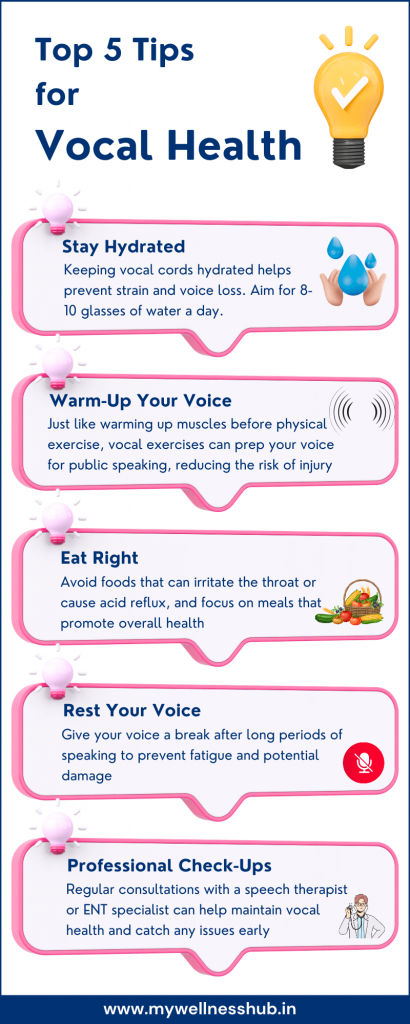Public Speaking Fear? Conquer It with a Speech Therapist
By Rajini D
Last Updated: May 1, 2024
Whether you’re presenting at a key business meeting or delivering a toast at a friend’s wedding, the ability to articulate your thoughts clearly and confidently is invaluable. Public speaking is a critical skill not only in professional settings but also in personal and community interactions. However, for many, the thought of standing in front of an audience can be daunting.
Common challenges like fear of public scrutiny and difficulty in expressing thoughts clearly are significant hurdles that prevent many from reaching their full potential as speakers. These issues often stem not just from nervousness but also from a lack of fundamental communication skills, which can make even the most knowledgeable individuals stumble under the spotlight.
Understanding Public Speaking Anxiety
Have you ever felt your heart race or your palms sweat just thinking about speaking in front of a crowd? If so, you’re not alone. It’s estimated that a staggering 75% of people experience some degree of anxiety when it comes to public speaking.
The Impact of Public Speaking Anxiety
Public speaking anxiety doesn’t just affect us emotionally; it can also have physical symptoms such as a shaky voice, dry mouth, rapid heartbeat, and even difficulty speaking. These symptoms can be frustrating and, at times, may feel like they’re undermining your ability to share your knowledge or personality.
Beyond the immediate effects, long-term public speaking anxiety can limit career progression, social interactions, and personal growth. In professional settings, the inability to present effectively can hinder promotions or lead to missed opportunities. Socially, it might prevent individuals from expressing their opinions or engaging in meaningful conversations.
Also read: Conquer Public Speaking Fears: Speech Therapy Techniques
How Speech-Language Pathologists Address Public Speaking Anxiety
Speech-language pathologists (SLPs), or speech therapists, are often associated with helping children or those with medical conditions, but they are equally skilled in aiding adults to conquer public speaking fears. SLPs use a variety of strategies tailored to each individual’s needs. Here’s how they might help:
- Assessment: An SLP will start with a thorough assessment to identify specific fears, triggers, and physical symptoms that occur during speaking. This might include analyzing your speech patterns, voice quality, and even your body language during a presentation.
- Technique Training: Based on the assessment, SLPs can teach techniques to manage physical symptoms, such as deep breathing exercises for relaxation and vocal warm-ups to stabilize the voice. They also provide strategies for structuring presentations to feel more in control.
- Practice and Feedback: With an SLP, you can practice your speeches in a safe, supportive environment. This practice is crucial as it helps build confidence through repeated exposures to speaking scenarios, coupled with constructive feedback, to improve your delivery.
- Cognitive Strategies: Sometimes, the fear of public speaking is rooted in how we perceive the task or ourselves. SLPs work on cognitive strategies to help reframe negative thoughts and build a more positive, confident approach to public speaking.
Common Public Speaking Fears and Speech Therapy Solutions
| Fear | Description | Speech Therapy Solution |
|---|---|---|
| Stage Fright | Anxiety and nervousness before speaking publicly. | Articulation exercises to improve diction and structure training to organize thoughts. |
| Lack of Clarity | Difficulty in articulating thoughts clearly. | Articulation exercises to improve diction, structure training to organize thoughts. |
| Poor Vocal Endurance | Voice tires easily during speeches. | Vocal health management to strengthen the voice and proper breathing techniques to support long speeches. |
How Speech Therapy Can Enhance Your Public Speaking Skills

Assessment of Strengths and Weaknesses
A speech-language pathologist (SLP) begins by evaluating your speaking skills to identify both your strengths and areas needing improvement. This evaluation covers key aspects like speech clarity, volume, pitch, and your pace, as well as non-verbal cues like posture and eye contact. This thorough assessment helps tailor a speech therapy plan that boosts your strengths and addresses your weaknesses effectively.
Crafting a Clear and Concise Message
Organizing thoughts clearly is crucial for effective public speaking. SLPs assist you in structuring your speech to ensure your message is not only clear but also compelling. By arranging your key points logically, you engage your audience better, making your speech memorable and impactful.
Delivery Techniques
Mastering delivery techniques is vital for dynamic public speaking. An SLP guides you through vocal exercises to control your tone, pace, and volume, enhancing your speech’s overall impact. You’ll also learn to use appropriate body language and facial expressions to reinforce your spoken words, making your presentation more powerful.
Practice and Feedback
Regular practice with an SLP offers a supportive environment where you can hone your public speaking skills. You’ll receive constructive feedback, make adjustments, and practice again, which not only improves your abilities but also builds your confidence. Over time, these sessions help you develop effective speaking habits that become second nature.
Practical Tips from Speech Therapy to Boost Confidence in Public Speaking
Speech therapy offers more than just articulation techniques; it provides a holistic approach to overcoming stage fright and enhancing your speaking skills. Here are some practical, easy-to-implement tips that you can start using today to make your next public speaking opportunity less and more successful.
Breathing Techniques to Manage Anxiety One of the most effective ways to control nerves is through proper breathing. When we’re nervous, our breathing tends to become shallow and quick, which only amplifies feelings of anxiety. Speech therapists often recommend diaphragmatic breathing, or belly breathing, as a way to manage this:
- Find a comfortable sitting or standing position.
- Place one hand on your belly, just below your ribs, and the other hand on your chest.
- Breathe deeply through your nose, ensuring your belly pushes against your hand while your chest remains relatively still.
- Exhale through pursed lips, like you’re blowing out a candle, feeling the hand on your belly go in, and use it to push all the air out.
- Repeat this process for a few minutes before your presentation or whenever you feel anxious.
This technique helps slow your breathing and heart rate, calming your nerves and enabling you to speak more clearly.
Positive Visualization Another powerful tool speech therapists use is positive visualization. This involves imagining yourself succeeding in your speaking engagement, delivering your speech flawlessly, and receiving a positive response from the audience. Here’s how you can practice this:
- Take a few minutes in a quiet place to close your eyes and breathe deeply.
- Visualize the venue where you will be speaking.
- Picture yourself walking confidently to the podium.
- Imagine delivering each part of your speech clearly and confidently.
- See your audience reacting positively, nodding in agreement, and applauding your effort.
Engaging in this exercise regularly can significantly reduce fear and build confidence.
Exercises to Improve Your Speaking Skills To strengthen your speaking skills, consider these simple yet effective exercises that you can do at home:
- Tongue Twisters: Practicing tongue twisters can improve articulation and pronunciation. Start slow and gradually increase your speed while maintaining clarity. This can make enunciating during speeches much easier.
- Record and Review: Use your smartphone or computer to record yourself giving a short speech. Playback the recording to observe your voice modulation, pacing, and use of pauses. This self-review can be incredibly effective in identifying areas for improvement.
- Mirror Practice: Stand in front of a mirror and practice your speech. Pay attention to your body language, especially your facial expressions and hand movements. Make sure they match the tone of what you’re saying and add to the effectiveness of your delivery.
Incorporating these techniques into your preparation can make a significant difference in how you handle your next public speaking task. Remember, the key to improvement is consistency. Regular practice not only prepares you for public speaking but also builds an overall confidence that enhances all areas of communication.
The Role of Non-verbal Communication
When we think of public speaking, it’s easy to focus solely on what we say and how we say it. However, the way we communicate non-verbally plays a crucial role in how our messages are received. Non-verbal cues, such as eye contact, gestures, and posture, can significantly enhance the effectiveness of your public speaking by reinforcing your words, building trust, and engaging your audience. Let’s explore how mastering these elements can elevate your presentations.
Eye Contact: The Window to Audience Engagement
Maintaining eye contact is one of the most powerful tools in public speaking. It helps establish a connection with your audience, making them feel acknowledged and involved. Here’s how to use eye contact effectively:
- Connect Individually: Try to make brief eye contact with different members of the audience throughout your speech. This can make large rooms feel more intimate and keeps listeners engaged.
- Maintain Balance: While it’s important to connect, overly prolonged eye contact can feel intimidating. Aim for a balance where you look at someone long enough to make a connection (usually about three to five seconds), then smoothly transition your gaze to another person or part of the room.
Gestures: Enhancing Your Message
Gestures are a dynamic part of communication that can help emphasize points, express enthusiasm, and make your speech more memorable. However, they must be natural and well-timed:
- Purposeful Movements: Use gestures that naturally complement your words. For example, enumerating points on your fingers can help clarify and emphasize your message.
- Avoid Overdoing It: Too many gestures can be distracting. Practice using movements that feel genuine and contribute positively to your message rather than detracting from it.
Posture: Conveying Confidence
Your stance says a lot about your confidence and authority. A good posture not only affects how others see you but can also influence how you feel about yourself during a presentation:
- Stand Tall: Keep your back straight, shoulders back, and head up. This posture projects confidence and helps with voice projection.
- Move with Intention: If your presentation allows, use space by moving purposefully. This can help engage different parts of your audience and make your speech more dynamic.
Facial Expressions: Reflecting Emotions
Facial expressions can mirror your emotions and help convey your message’s emotional tone, making your words more impactful:
- Match Expressions to Content: If you’re discussing something positive, let your face show happiness or excitement. Conversely, a serious topic should reflect a more composed or thoughtful expression.
- Practice in the Mirror: Before your speech, practice in front of a mirror to see how your facial expressions align with your words. This can help you adjust to ensure your facial cues are effectively communicating your emotions.
Know more: How to Improve Attention and Concentration in Studies?
Maintaining Vocal Health
Your voice is not just a key tool in public speaking; it’s an essential part of your identity and how you connect with others. Like any tool, it requires care and maintenance, especially if you use it frequently in high-stakes environments like presentations or meetings. Ensuring your vocal health is maintained can significantly impact your overall communication effectiveness. Here are some practical tips to help keep your voice clear and strong.

Stay Hydrated
Hydration is critical for vocal health. Dry vocal cords are more prone to irritation and injury, so keeping them moist is crucial:
- Drink Plenty of Water: Aim for at least eight 8-ounce glasses of water a day. More if you are speaking extensively or if the weather is particularly dry.
- Avoid Dehydrating Substances: Reduce your intake of caffeine and alcohol, as these can dehydrate your body and, consequently, your vocal cords.
Warm-Up Your Voice
Just as athletes need to warm up before a game, speakers should warm up their vocal cords before a presentation to prevent strain:
- Simple Vocal Warm-ups: Try humming or gently singing scales to get your vocal cords ready for action.
- Practice Breathing Exercises: These can relax your throat and improve your control over your voice.
Mind Your Diet
What you eat can affect your voice, too. Some foods and habits can increase the risk of acid reflux, which can damage your vocal cords:
- Eat Light Before Speaking: Avoid heavy meals that can cause discomfort and increase the likelihood of reflux when you’re about to speak.
- Limit Acidic Foods: Foods like tomatoes and citrus, as well as spicy dishes, can trigger reflux. Be mindful of these, especially if you need to speak later.
Rest Your Voice
Rest is just as important as practice. Giving your voice a break can help prevent long-term damage:
- Avoid Shouting or Whispering: Both can strain your voice more than normal speech.
- Silence is Golden: When possible, give your voice time to recover after heavy use, especially if you feel hoarseness setting in.
Seek Professional Help When Needed
If you notice persistent hoarseness, pain, or any other change in your voice that doesn’t go away with basic care, it might be time to consult a professional:
- Visit a Speech Therapist: A speech-language pathologist can assess your vocal health and provide strategies to maintain or improve it.
Comparison of Public Speaking Skills Before and After Speech Therapy
| Skill | Before Therapy | After Therapy |
|---|---|---|
| Breath Control | Frequent breathlessness, shallow breathing | Deep, controlled breathing; reduced anxiety |
| Articulation | Mumbling, unclear speech | Clear, distinct pronunciation |
| Nonverbal Communication | Limited use of gestures, poor eye contact | Effective gestures, strong eye contact |
| Fluency | Frequent pauses, “um”s and “ah”s, stuttering | Smooth, continuous speech with confidence |
| Accent Clarity | Accent interferes with clarity | Accent softened, clearer communication |
| Vocal Health | Strained voice, vocal fatigue | Stronger voice, less strain, improved endurance |
Conclusion
Speech therapy isn’t just for overcoming the fear of public speaking; it also improves how you communicate every day. By learning how to manage your voice and use body language effectively, you can feel more confident and become better at sharing your thoughts, whether it’s during a big presentation or a casual chat. These skills are great for professional success and making better connections with people in your life.
If you’re interested in enhancing your speaking abilities, Wellness Hub is here to help. We have a team of expert speech therapists ready to guide you. They’ll work with you to improve your skills and help you become a confident speaker. Visit us at Wellness Hub, and let’s start this journey together. Everyone can become a great speaker with the right help and practice.
Frequently Asked Questions:
1. What is speech therapy for public speaking?
Speech therapy for public speaking involves working with a speech-language pathologist (SLP) to improve your communication skills. SLPs can help you overcome public speaking anxiety, enhance your vocal delivery, use effective non-verbal cues like eye contact and gestures, and maintain your vocal health.
2. How can speech therapy help with public speaking anxiety?
Speech therapists use a variety of techniques to help individuals manage and reduce public speaking anxiety. These include breathing exercises, positive visualization, and practical speaking exercises that build confidence and improve speech delivery.
3. What are some simple exercises to improve public speaking skills?
Some simple exercises include practicing breathing techniques, recording yourself to review speech patterns, and engaging in tongue twisters to improve articulation. Additionally, making eye contact with members of the audience can help make you’re speaking more engaging.
4. Can speech therapy improve professional communication skills?
Yes, speech therapy can significantly enhance professional communication skills. It helps in structuring your thoughts clearly, using a confident tone, and delivering your message effectively, which are essential for professional success.
5. What are the best practices for maintaining vocal health for public speakers?
Best practices for maintaining vocal health include staying hydrated, avoiding overly spicy and acidic foods, practicing vocal warm-ups before speaking, and resting your voice when needed. Regular check-ups with a speech therapist can also ensure long-term vocal health.
6. Where can I find a qualified speech-language pathologist for public speaking?
You can find qualified speech-language pathologists through healthcare providers, professional associations or by visiting the Wellness Hub website. We connect you with experienced SLPs who specialize in public speaking and communication enhancement.
7. How often should I practice public speaking techniques learned in speech therapy?
Consistency is key in mastering public speaking techniques. Practicing regularly, ideally daily, with exercises tailored to your specific needs by a speech therapist will yield the best results. Regular feedback sessions can also help adjust techniques as you improve.
8. How long does it take to see improvements in public speaking from speech therapy?
The time it takes to see improvements in public speaking skills through speech therapy can vary depending on individual needs and consistency in practice. Most people start to notice improvements within a few weeks of regular sessions and practice. However, significant changes and mastery of techniques may take several months.
9. What non-verbal communication skills are most important for public speaking?
Key non-verbal communication skills for public speaking include maintaining appropriate eye contact, using meaningful gestures, displaying confident posture, and managing facial expressions to convey the right emotions and messages. Mastering these skills can significantly enhance the effectiveness of your spoken words.
10. Can speech therapy help with accent reduction for better public speaking?
Yes, speech therapy can help with accent reduction to improve clarity and comprehensibility in public speaking. Speech-language pathologists work on accent modification to help speakers articulate words more clearly and reduce barriers to communication, making their speech more easily understood by a broader audience.
About the Author:
Rajini Darugupally
M.Sc., Speech-Language Pathologist (9+ years of experience)
Rajini is a passionate and dedicated Speech-Language Pathologist with over 9+ years of experience, specializing in both developmental speech and language disorders in children and rehabilitation in adults. Driven by a desire to empower each individual to find their voice, Rajini brings a wealth of experience and a warm, genuine approach to therapy. Currently, at Wellness Hub, she thrives in a team environment that values innovation, compassion, and achieving results for their clients.
Book your Free Consultation Today
Parent/Caregiver Info:
Client’s Details:
* Error Message








